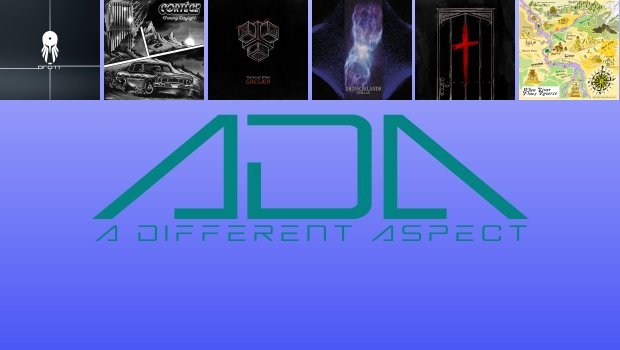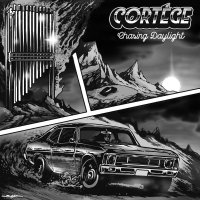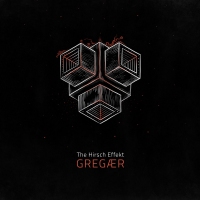In this update we feature:
• Drott – Drott
• Cortége – Chasing Daylight
• The Hirsch Effekt – Gregær
• Various Artists (VA) – Drone Islands: Stellar
• Föss – Memorias de la Peste
• River Flows Reverse – When River Flows Reverse
Nick Hudson

This is a curious release that seems to have flown largely under the radar, which is surprising considering that it contains members of Enslaved and Ulver. I’m not sure how I’d describe their overall sound, as they have made a point of making each track on their debut EP different. For example, there is something ancient about the sound of opening number Shikoba and I couldn’t place where it seemed to come from. Upon Googling. ‘Shikoba’ is a (Native American) Choctaw word for ‘Feather’, and that fits in two ways. One, because I did listen to some traditional Choctaw music on YouTube, and it seems clear the band must have too as there are distinct resemblances; and two, because even when the music crescendos, it remains light as a feather.
This sense of world music is carried on throughout the EP, though when I say world music it is probably not what you might assume when you hear the term. Rather, each of the four tracks recognise a different region of the Earth, and so providing music representing the world. There’s a lot of grandeur and majesty in the music, and it all sounds much larger than you might expect from just the trio of Arve Isdal, Ivar Thormodsæter and Matias Monson. The following Milonga del Agya is another interesting example of DROTT’s take on music from around the world, because the Milonga is a lively style of South American music and dance that normally has a fast tempo. This track does evoke the music of South America, but sounds almost like a dirge.
Dance of the Mylings, on the other hand, sounds like a wonderful interpolation of Scandinavian folk and an almost techno beat. It sounds sinister and menacing, and looking up ‘Mylings’ I discover them to be the souls of children forced to roam the earth until they can find someone to bury them properly. That makes sense. The dance becomes more and more off-kilter and odd as it progresses. Finally Numen sounds far more regimented – like a martial march. This time there is a real Eastern flavour, perhaps even reminding me a little of Steve Hackett’s The Steps.
Overall, this is an absolutely fascinating and thoroughly enjoyable first release from DROTT, my only complaint being that it is far too short. There’s so much more of the world to explore, and I want to hear it through the aural images of these three talented musicians. The soundscapes DROTT create are highly original, taking notes from folk, jazz and post rock, among others. It’s a cliché to say that music transports, but it’s one that’s hard to avoid when describing DROTT. In a world that is still largely locked down and only beginning to find its way back to some semblance of normalcy, DROTT certainly provides a welcome escape.
Nick Hudson
Cortége are a duo who on this EP play bass, Moog, Mellotron, tubular bells (Mike Swarbrick) and drums (Adrian Voorhies), presenting this release as “if Earth and Pink Floyd teamed up and did a soundtrack to a David Lynch film.” Well, that couldn’t fail to gain my interest. But does it live up to the hype? Actually, yes. I admit to not being familiar with Earth, but there are definite Floydian touches, and this music would certainly not be out of place in a Lynch soundtrack. Or even Morricone, as you can’t deny the spaghetti western vibe. This is doomy desert rock ambient. One of the Bandcamp tags is ‘dark ambient’, but it’s not. This is ambient noir. It’s freaking fabulous. It’s full of clichés, but deliberately and knowingly so. Caught somewhere between a pastiche and a homage, this had the potential to sound bloody awful if Cortége didn’t get it right. Thankfully, this is a joy to listen to.
Again, I’m going to quote from the Bandcamp page, which is not something I generally like to do, but the band have really summed themselves up well. What you get on Chasing Daylight are “lush arrangements [that] wind through the familiar Cortége territories of drone, prog, doom, western and ambient soundscapes”. This is heavy, hypnotic, expansive and apocalyptic. It’s the sound that’s left in the desert after someone tested an atomic bomb. It’s Charlton Heston on his knees at the end of Planet of the Apes. People talk of music being cinematic, well Chasing Daylight is as cinematic as it comes. It’s massive and dramatic, and I love it.
My favourite Bandcamp tag for this release is ‘post western’. It couldn’t be more appropriate, because Cortége really do seem to have created a whole new genre, and post western perfectly describes it. I’ll be honest and say I’m not sure how much of this I’d be able to listen to in one sitting, but by that token, Cortége have made this release the perfect length; not only does it not outstay its welcome, it actually leaves me wanting to hear more. I guess I might just have to investigate a few more or their releases…
Nick Hudson
This will undoubtedly by one of my favourite releases from 2021. It’s one of those EPs that I wish were a full album. I cannot overstate how much I love this album, nor how surprising it was. I reviewed The Hirsch Effekt’s Kollaps last year – from which two of the tracks on Gregær come. The remaining two tracks comprise one from earlier album Eskapist (my first encounter with The Hirsch Effekt) and one new song. Although the EP is advertised as orchestral versions of the songs, this gives no indication of just how radically reworked they are. I won’t say it’s to the point of being unrecognisable, but it’s certainly far more than most bands do when they record orchestral versions. I was expecting to like this release, but not be blown away by it.
The Hirsch Effekt may be a tech-metal band, but these re-imaginings are more Frank Zappa than Meshuggah. While the band, and accompanying small orchestra, follow the basic structure of the original songs, they soar and groove in a truly ambitious manner. It seems almost destined to fail, and like Icarus, to fall when they try to fly too high. But no, there is no fall. The use of an orchestra might imply a more classical tone, but while that is the case, the music often sounds more like jazz. The use of backing vocals provides another point of difference from the originals. It’s all so gloriously over the top, and it works phenomenally well. It’s just a shame that the many people who might well enjoy this release, may never listen to it because of how the band normally sound.
And, interesting, some of that normal sound is retained. Nils Wittrock has a fantastic voice, but for the most part sings in a softer style than normal. This means that when he screams, it has far more impact. It’s not often that you hear screams backed by a choir and orchestra, and it works surprisingly well. The title track comes across almost as the weakest, but I’m not sure it is – so much as there is nothing to compare it to. It sounds as if it were either an unreleased The Hirsch Effekt track that was reimagined in the same manner as the others, or a new track that was written to be converted. That is, rather than writing a new song for choir and orchestra, the band has written a song in their conventional manner, and reworked it. It’s not a bad song by any means, but of the four, it is the one that feels like it didn’t quite reach its potential heights.
Nick Hudson

I’m not the sort of person to write off entire genres simply because there always seem to gems to find in the most unlikely places. When it comes to drone, there’s definitely more that I don’t like than do, but every now and then a drone release will sweep me off my feet, and transport me to another place. Usually, this tends to be when the drone is of a more traditional, classical or folk nature – but here I’m off in a completely different direction. This third volume of the Drone Islands has left the Earth and is heading into space – and it’s breathtaking in its expansiveness and exploratory nature. This is dark ambient music which is more thrilling than any sci-fi horror film. Its mix of dull, clanking industrial, and alien sounds are an absolute aural treat.
Released on Eighth Tower Records (part of the Unexplained Sounds group), this is the second album from the label to blow me away this year. (The first was their second tribute to Lovecraft, The Black Stone.) What amazes me about these albums is how the various contributors really manage to express the themes and concepts of the album. In this instance, there is no doubting at any point that the setting is not space. There is always a sense of an infinite void beyond the confines of whatever track I’m listening to. Thanks to it being a compilation there is also far more variation than you might otherwise find within a drone album. Yet for all the variety of sounds and approaches to the theme, there is a consistency of sound, because they keep so well to that theme. It really does feel like a series of explorations in space, mostly non-eventful, but no less enjoyable for that. (And anyway, the impact of the scarier moments wouldn’t be as great if they were omnipresent.)
Drone Islands: Stellar is somewhat of an International Space Station of talent, featuring artists from across the world (including, to name just three, India, Hungary, and Mexico), creating drones of an astronomical nature, and showcasing their particular talents. The various approaches the contributors take to create a piece that fits the concept firmly dismisses the argument that drone music is all the same – just a series of minimalist, sustained notes. The drones within this album are integral to the musical structure and stories of the various tracks, which all invoke imagery of space, sci-fi, and at times, sci-fi horror. Everyone knows that there is no sound (as we conventionally think of it, at least) in space, but Drone Islands: Stellar is absolutely what most of us imagine space to sound like. Let it take you on a voyage…
Nick Hudson
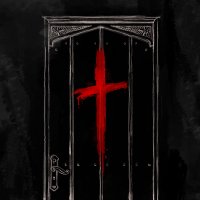
Föss blew me away at the beginning of this year with their incidental music for Memorias de la Peste. Although Föss is a sludgy doom band, you’ll find none of that here. Rather than a wall of doomy sound and harsh vocals, this is an almost ambient instrumental delight. Memorias de la Peste is an ambitious undertaking by La Tramoyista, a new publishing house that seeks to “rescue and adapt” classic literature. Thus Daniel Defoe’s A Journal of the Plague Year finds itself not just translated and adapted by Noemí Padilla Santana, but fully illustrated by Alberto Hernández and soundtracked by Föss. The themes from Föss to accompany the book have even been performed by Herenia Frigolet Ortega. All in all, a truly multi-media affair on a grand scale for such a small independent publishing house from the Canary Islands.
But, how does it sound? Well, quite frankly, fabulous. And it couldn’t be more timely, given most of us have lived our own version of a plague year. The story begins in late 1664, when the plague looms like a shadow. People are aware of it, but have not yet realised how much of a difference it will make to their lives. The comparisons to early 2020 are obvious. By 1665, London is battling the greatest plague epidemic in its history. The disease advances like a silent and implacable enemy. The incidental music from Föss provides everything you would expect from such a setting. It’s dramatic, haunting, melancholic – and despite everything, hopeful. Beautiful is not a word I’d ever expect to use to describe the music of Föss, but it is unarguably so in this instance.
Given the normal sounds of the band, I was expecting far more of an industrial and dark ambient vibe to Memorias de la Peste, but while the music approaches these territories at times, it never really needs to go all out in this direction, giving it a really nice and well-rounded feel. If anything, Föss sometimes comes closer to the progressive electronic sound of the Berlin School, when they want to portray the more foreboding atmospheres. At times there are also what might be field recordings, and they are another wonderful addition to the mix. I’m not sure if they’re found sounds or folly, but regardless they sound great.
Everything about this album feels so well thought out, and executed perfectly. This is an album which will have likely slipped under the radar of many. I’m glad I heard it, as it is an album I keep returning to. If I could read Spanish, I’d go the whole hog and buy the book.
Nick Hudson
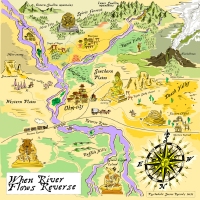
This is one of the most beautiful and impressive albums I’ve heard this year. Because I follow Lemurian Folk Songs on FB, I was alerted to it when it was released, and I’ve been loving it ever since. Despite being a combination of musicians from Hungary’s psych and post rock scene, When River Flows Reverse sounds very little like the normal sounds of any of the bands. The psych is still there, but very much in a more folk manner, and largely due to the vocal style of Kriszti Benus more than any of the instrumentation. Indeed, take away her vocals, and the album’s opening number is almost a simple acoustic folk number. The Bandcamp pages states that “all instruments [were] recorded in a cold shed in the middle of the muddy forest of Hungary”, and it’s easy to believe that.
Even the guitar of Bence Ambrus, while still recognisably him, is more subdued and reflective. I love his guitar style anyway, but this is the most effective his playing has ever been. It definitely has me feeling like I’m floating down a river, wherever it may take me. It’s lazy and fluid. But while it might initially seem welcoming, Bence still has some tricks up his sleeve, where the river shows it still holds some dangerous currents. Apart from the music being more Slavic than Scandinavian, this album reminds me a little of Ihsahn’s Hardingrock album. There’s really not that much similarity in sound, but in both there’s a sense of tapping ancient sounds, and recreating them in a modern way.
What I find quite impressive is how metal the band can sometimes sound, without ever really coming to that style from any conventional route. River Flows Reverse show that heaviness doesn’t necessarily need to have anything to do with volume or intensity. El Sendaro II & III are simply heavy without trying. And that trumpet is just gorgeous. It sounds so completely out of place with the almost primal beat underneath, and yet fits so perfectly. Just to take the contrast and counterflow further, that folk rhythm takes on an acoustic dub vibe (and yes I realise that acoustic dub is pretty much an oxymoron). There’s so much going on in this album, with no one style dominating. That the whole sounds so cohesive is a true achievement, as it could so easily have turned into a nightmarish mess. If this is the musicians being bored and playing with their instruments (as per the Bandcamp page), then they clearly know each other inside out, because everything flows beautifully. This is indeed their lockdown masterpiece. More, please!

